| My Television |
|---|
|
|
Ushiyama Junichi
|
Ushiyama joined Nippon Television in 1953, when Japan’s first television broadcasts were taking place, and became a pioneering producer leading the first generation. In addition to the production of numerous documentary series, his many accomplishments include the founding of the Nippon Audio-Visual Library for collecting and preserving exceptional work. This introduction focuses on his best-known series, Non-Fiction Theater, for which he actively recruited film directors and other talent from outside and which resulted in many famous programs. These will be shown alongside a new film which started from the late Sato Makoto’s study group on Ushiyama.
All the following programs are produced by Ushiyama Junichi. Production Company: Nippon Television Network Corporation (NTV)
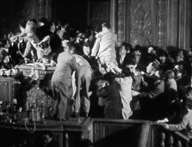 The 19th National Assembly
The 19th National Assembly
(Dai 19 kokkai)- JAPAN / 1954 / Japanese / B&W / Video / 30 min
Narrative Structure, Director: Ushiyama Junichi
Photography: Nippon Television Network Corporation Film Department
Editing: Ishikawa Toshio
Narration: Mogi Taro
Music Selection: Wakao Hatsuo
This documentary is a record of the National Assembly in 1954, which was thrown into extreme confusion by a no-confidence vote in the Yoshida cabinet, a bribery case over shipbuilding during World War II, and even bench-clearing brawls.
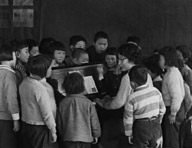 Bear Songs at School
Bear Songs at School
(Kuma no uta no gakko)- JAPAN / 1961 / Japanese / B&W / Video / 26 min
Directors: Nishio Zensuke, Goto Hidehiko
Photography: Komuro Yoshikazu
Editing: Fukazawa Junzo
Sound Design: Uno Seiichiro
Narration: Kumakura Kazuo
This documentary, made as a pilot for Non-Fiction Theater, shows the everyday school life of a teacher couple and their students in a small extension school deep in the mountains in Shimokita Peninsula.
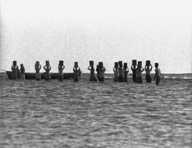 Water and Wind
Water and Wind
(Mizu to kaze)- JAPAN / 1963 / Japanese / B&W / Video / 37 min
Directors: Ushiyama Junichi, Goto Hidehiko
Script: Hayasaka Akira
Photography: Takagi Makoto, Kimura Akira
Editing: Tamario Kurahei
Sound Effects: Iwami Kiyoshi
Music: Sato Masaru
Narration: Suzuki Mizuho, Natsukawa Shizue
In cooperation with: Moriguchi Katsu, Shu Hajime
This is a report on the severe life conditions of people living on isolated islands in U.S.-occupied Okinawa. Awarded the Japan Arts Festival Prize in 1963 and the Cannes International Film Festival Special Jury Prize in 1964.
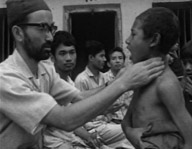 Bearded Doctor in the Highlands
Bearded Doctor in the Highlands
(Sekai no yane no hige dokuta)- JAPAN / 1963 / Japanese / B&W / Video / 25 min
Director: Ikematsu Toshio
Photography: Harada Isao
Editing: Ikeda Ryuzo
Sound Design: Morimoto Takao
Narration: Komatsu Hosei
In cooperation with: The Japan Christian Medical Association
This is a depiction of the relationship between a doctor couple, the Iwamuras, who work in a mountain village in Nepal, and orphans. Recipient of awards from the National Association of Commercial Broadcasters in Japan and the Motion Picture and Television Engineering Society of Japan, Inc., in 1963.
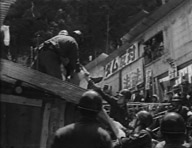 A Rebel’s Fortress
A Rebel’s Fortress
(Hankotsu no toride)- JAPAN / 1964 / Japanese / B&W / Video / 25 min
Directors: Oshima Nagisa, Yoshida Minoru
Photography: Ichimura Hiroshi, Kimura Akira, Nomura Hisatoshi
Editing: Miyamoto Yusuke
Sound Design: Iwami Kiyoshi
Narration: Tokugawa Musei
This documentary is a record of Murohara Tomoyuki, who built a fort named “Beehive Castle” to protest the unjust construction of a dam in his mountain village in Kumamoto Prefecture.
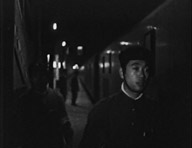 A National Railway Worker
A National Railway Worker
(Aru kokutetsu jomuin: Suto chushi zenya)- JAPAN / 1964 / Japanese / B&W / Video / 25 min
Directors: Oshima Nagisa, Tsuchimoto Noriaki, Hani Susumu, Sekikawa Hideo, Onuma Tetsuro, Tamura Takeshi, Okamoto Yoshihiko, et al.
Photography: Kimura Akira, et al.
Editing: Ikeda Ryuzo
Sound Design: Iwami Kiyoshi
Narration: Toura Rokko
Starting at the engine depot in the last minutes before workers go on strike for higher wages, this documentary follows the progress of the strike and shows the vacillation in the thinking of the Japan National Railways workers.
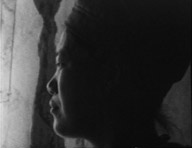 Civic War
Civic War
(Shimin senso)- JAPAN / 1965 / Japanese / B&W / Video / 25 min
Director: Tsuchimoto Noriaki
Photography: Mishima Toshihiko, Itaya Kozo
Editing: Sugiyama Tadao
Sound Design: Iwami Kiyoshi
Narration: Komatsu Hosei
War returnees and Koreans who have set up shop in the so called “International Market” in Onomichi City are given notice to voluntarily vacate the land as part of a port improvement plan. This documentary gives a detailed account of the negotiations between the city authorities and residents.
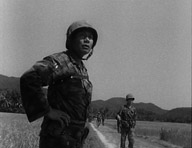 War Chronicle of a South Vietnam Marine Battalion
War Chronicle of a South Vietnam Marine Battalion
(Minami Vietnam kaihei daitai senki)- JAPAN / 1965 / Japanese, Vietnamese / B&W / Video / 50 min
Director, Narrative Structure: Ushiyama Junichi
Research: Ushiyama Junichi, Sasaki Hisao, Mori Masahiro
Photography: Kimura Akira, Ishikawa Bunyo
Editing: Ikeda Ryuzo
Sound Effects: Iwami Kiyoshi
Music: Yamamoto Naozumi
Narration: Suzuki Mizuho
This is an embedded journalistic report of the South Vietnamese government forces. Footage showing the execution of a guerrilla in the first part caused an outcry, and parts two and three were withdrawn. This version is a 1970 compilation omnibus of all three parts.
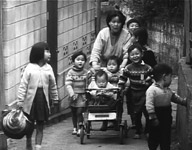 Tachi’s Family
Tachi’s Family
(Tachi-san ikka)- JAPAN / 1965 / Japanese / B&W / Video / 25 min
Director: Ichioka Yasuko
Photography: Kageyama Masahide
Editing: Sugiyama Tadao
Sound Design: Iwami Kiyoshi
Narration: Uno Jukichi
The Tachi family is on summer holiday, with the mother busy taking care of nine kids. The camera captures the everyday life of a big family. Recipient of awards from the National Association of Commercial Broadcasters in Japan and the Motion Picture and Television Engineering Society of Japan, Inc., in 1965.
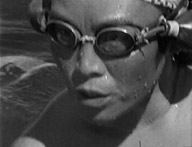 Ama —Japan’s Women of the Sea—
Ama —Japan’s Women of the Sea—
- JAPAN / 1968 / Japanese / Color / Video / 25 min
Director: Ichioka Yasuko
Photography: Tada Makoto
Editing: Ikeda Ryuzo
Sound Design: Morimoto Takao
Music: Mamiya Michio
Narration: Kume Akira
In cooperation with: RKC Kochi Broadcasting, Nagoya Broadcasting, JRT Shikoku Broadcasting, and NBC Nagasaki Broadcasting
A day in the life of an Ama woman, who goes fishing for abalone, and her husband, who brings the rope up when she signals from under the sea. This documentary shows the countless repetitions of their daily work. Recipient of an award from the Motion Picture and Television Engineering Society of Japan, Inc., in 1969.
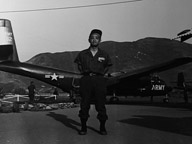 Ushiyama Junichi: Our Wonderful Television
Ushiyama Junichi: Our Wonderful Television
(Terebi ni chosen shita otoko: Ushiyama Junichi)- JAPAN / 2011 / Japanese / Color, B&W / Video / 85 min
Director: Hatakeyama Yohei
Planning: Sato Makoto
Photography: Otsu Koshiro, Imaizumi Hideo, Ourakata Eri, Ojiri Koichi, Shimada Akira
Editing: Hata Takeshi
Music: Suga Dairo
Producer: Fujimoto Mitsuko
This project, based on research on Ushiyama Junichi by director Sato Makoto’s study group at the Film School of Tokyo, consists of copious interviews with 22 related people.
